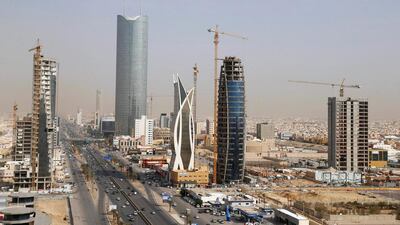The IMF said on Tuesday it had cut its forecast for Arabian Gulf oil producers’ economic growth this year, as their output cut deal is expected to wipe out any gains from higher oil prices in terms of government revenue.
The gloomy regional prediction is in contrast to a slightly brighter outlook for the world economy as a whole, which the IMF projects will grow by 3.5 per cent this year, up 0.1 per cent from its previous update and up from a growth rate of 3.1 per cent last year. It left its forecast for next year at 3.6 per cent.
“The expected growth improvements in 2017 and 2018 are broadly based,” said Maurice Obstfeld, the IMF’s head of research, but he added that “growth remains tepid in many advanced economies, and commodity exporters continue to struggle”.
The IMF also said there is a downside threat to broad economic growth from protectionist trade policies that have been gaining political traction in the more advanced economies, especially the US, under president Donald Trump, as well as the UK and some parts of Europe, which have turned anti-globalist.
The IMF said it expects real GDP growth for the seven oil-exporting countries in the Middle East of 1.9 per cent this year, which is a full percentage point lower than the 2.9 per cent growth it forecast for the group in October.
Saudi Arabia’s growth is forecast to grow at just 0.4 per cent this year, compared with last October’s projection of 2 per cent. The UAE’s forecast has been cut to 1.5 per cent from 2.5 per cent forecast in October.
The hardest hit within the group is Iraq, where 0.5 per cent growth had been expected, but it is now forecast to contract by 3.1 per cent. Also forecast to contract is Kuwait, by 0.2 per cent, compared with a previous forecast of 2.6 per cent growth.
“Iraq, Kuwait, Saudi Arabia, and the United Arab Emirates are bearing the brunt of the cuts,” the IMF said, referring to the deal reached in November to cut Opec production by 1.2 million barrels per day (bpd) to 32.5 million bpd. Saudi Arabia agreed to make up about half of the total cut and has been producing at a rate of about 10 million bpd since the deal took effect in January, compared with record production of about 10.7 million bpd last autumn.
Opec was joined by 11 other producers from outside the group, led by Russia, the world’s largest oil producer, and the deal was to run for an initial six months, but it is widely expected to be extended at least until the end of the year.
While the deal is credited with a rise of about 20 per cent in oil prices over the past few months, the lost production is biting on those bearing the heaviest load. The lower forecast for Saudi Arabia brings the IMF into line with many other economic forecasters.
“It seems the IMF has finally come around to the view that the kingdom’s growth is going to be weak for sometime in this ‘lower for longer’ oil price environment,” said Jason Tuvey, a regional analyst at Capital Economics.
Similarly, the IMF’s view is in line with other private institutional forecasts, such as that of Abu Dhabi Commercial Bank (ADCB), which is projecting real GDP growth for the UAE to slow to 1.2 per cent this year, down from 2.5 per cent last year.
“This is due to an expected contraction in real oil sector activity, linked to the Opec-led production cut,” said Monica Malik, ADCB’s chief economist. “Nevertheless, we expect to see an acceleration in real non-oil GDP growth to 2.9 per cent in 2017, from 2.3 per cent in 2016, partly due to a Dubai-led strengthening in investment activity. And we see headline GDP growth accelerating in 2018 to 3.1 per cent, supported by both stronger oil and non-oil GDP growth.”
Indeed, the IMF expects UAE real GDP to pick up sharply next year to 4.4 per cent.
amcauley@thenational.ae
Follow The National's Business section on Twitter

